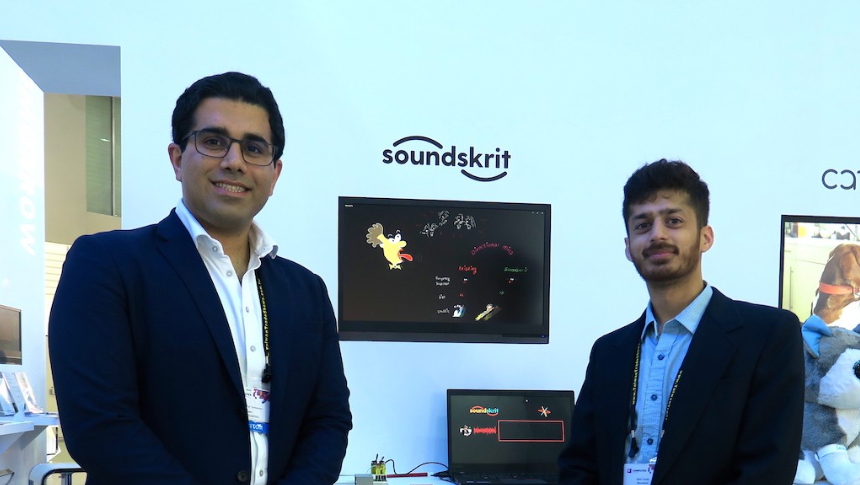Q&A: Canadian Startup’s Microphone Chips Seek a Home inside Made-in-Taiwan PCs

Montreal-based startup Soundskrit (Open in new window) aims to install its specialized audio chips into computers and portable devices made in Taiwan.
Cofounder Sahil Gupta spoke with Business Next earlier this month at the 2018 Computex Taipei trade show. He came to show a prototype of his microphone at a display curated by Taiwan-based Epoch Foundation (Open in new window)’s incubation initiative Garage+ Startup Global Program.
The year-old Soundskrit is using sound velocity readings – inspired by the way insects communicate – to design microphone chips for consumer electronics. The chips may be able to recognize speech to a point where the host device can tell who’s talking at a crowded event.
This Q&A with Gupta explains Soundskrit’s origins and plans:
Q: Tell us a bit about yourself and about your role at Soundskrit.
A: I got my bachelor’s and master’s degree in electrical and computer Engineering at Cornell University in upstate New York. I’ve always wanted to be an entrepreneur, and I ended up joining two accelerators prior to joining Soudskrit.
When TandemLaunch, an incubator in Montreal, gave me an offer to join a new project which is now known as Soundskrit, I was very excited. I moved to Montreal from New York and became part of the Soundskrit team. The company was founded in September last year. We currently have a team of four.
Iman Moazzen, who is also with us today, is the cofounder and software lead; Stephane Leahy is the cofounder and hardware lead, and we have a fourth member, Ahmed Abdelaziz from the University of Waterloo, who is in charge of our production.
Q: What are your featured products?
A: Soundskrit is a Montreal-based tech startup focusing on developing a velocity-based directional microphone to improve speech recognition and sound recording in smart devices.
Professor Ron Miles at Binghamton University in New York has spent many years of research studying the auditory systems of many small insects. What he found was that a lot of insects are actually measuring the velocity of the sound rather than the pressure. Inspired by that idea, he came up with this concept to measure sound in a directional manner.
He invented the core intellectual property of the design of what’s inside the microphone—this idea of how we can make up microphone to pick up the direction of the sound with very good response. We’re taking that as our core concept and building on top of it and trying to commercialize it into a device. We’re looking at applications like video conferencing, virtual conferencing and taking meeting minutes. For example, if you want to take meeting minutes in a conference room, you can imagine using it to track who’s saying what based on where they’re sitting.
Q: What’s next for Soundskrit?
A: We raised an 800,000 Canadian dollar seed round in December last year. It’s a seed fund raised from TandemLaunch, a Montreal-based incubator that focuses on commercializing research. We’re currently working on our proof of concept process as we’re still in early stages.
By the end of this year, we will have our MEMS (Micro Electrical-Mechanical System) chip on a smaller scale. We will continue to work on our product development, in particular the design of microphone’s mechanical structure.
Q: Do you plan to contract with Taiwanese companies in the future?
A: We’re here in Taiwan because we’re seeing a lot of potential to work with Taiwanese companies. I think Taiwan has a lot of strong companies in manufacturing as well as in personal computer industries. One of the applications we’re looking at is PCs and laptops.
We think Taiwan is a perfect place for us to understand the current solutions and the current limitations of computer hardware. Thanks to the support from Garage+ Startup Global Program, we have a chance to meet with some of the directors and company executives of professional Taiwanese computer makers like Quanta Computer. It’s great for us because eventually we want to embed our chips into a laptop or a hardware device.
We’re visiting Taiwan for the first time and it’s been an extraordinary experience because you get to have first-hand information of Taiwan’s computer industry.
〔Original :Meet Startup @ TW〕
Source: Meet Global (Open in new window)